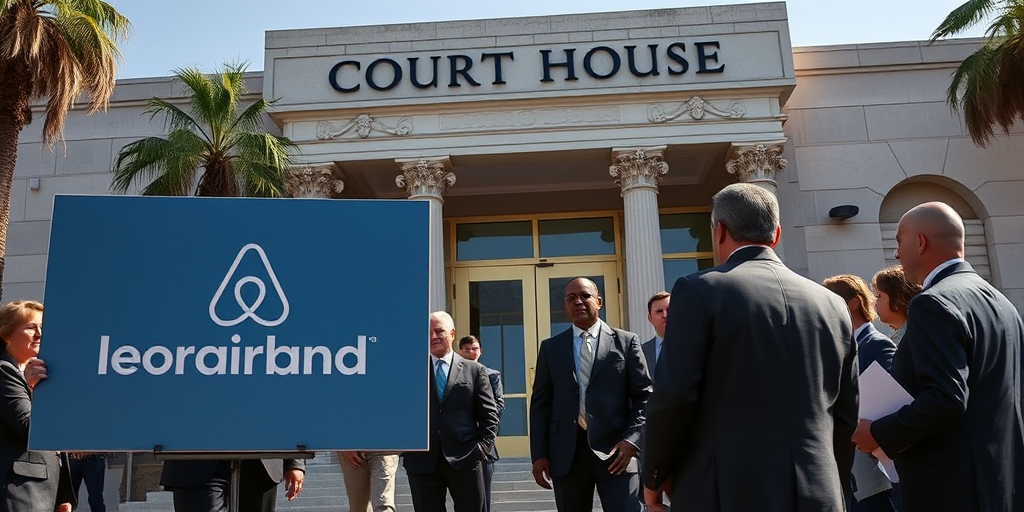**Heritage Foundation Sues Airbnb: The Battle Continues Amidst Growing Concerns Over Corporate Politics**
In a legal escalation against corporate America’s perceived ideological shifts, the Heritage Foundation has filed a lawsuit against Airbnb, accusing the company of excluding a proposal intended to depoliticize corporate governance. This move amplifies ongoing discourse about the influence of politics in business and its local impact on communities across the United States.
**Heritage’s Legal Standpoint**
The Heritage Foundation, a key player in this lawsuit, alleges that Airbnb violated Securities and Exchange Commission (SEC) rules by excluding its proposal from the company’s annual shareholder meeting agenda. The Foundation, a shareholder in Airbnb, sought to discourage the housing rental giant from adhering to activist demands, particularly the boycott, divestment, and sanctions (BDS) movement against Israel.
“The exclusion of our proposal is a clear violation of shareholder rights,” stated Andrew Olivastro, Chief Advancement Officer at Heritage. “Airbnb seems to have ignored legal requirements to notify us of the exclusion and provide justification, which is a concerning sign of viewpoint discrimination,” he continued.
**The Community Perspective**
Locally, this issue resonates with various community stakeholders concerned about the politicization of businesses. Many residents within the U.S., particularly those connected to regions like the Rio Grande Valley (RGV), view such corporate practices as a slippery slope potentially harmful to local economies and social cohesion.
Dave Hernandez, a small business owner in McAllen, Texas, shares these concerns. “When companies start taking sides politically, it trickles down and can impact smaller, locally-owned businesses. We rely on a fair and neutral market environment to thrive,” he emphasized.
**A Local Lens on National Issues**
Airbnb’s decision not to include Heritage’s proposal in its materials, while allegedly entertaining submissions aligned with progressive ideals—like those from liberal-leaning pension funds—raises broader questions about the intersection of business and politics that are felt acutely at the local level.
“It’s essential to maintain corporate neutrality,” argues Linda Sanchez, a political science professor at University of Texas Rio Grande Valley. “Corporate decisions should prioritize shareholder value and ethical business practices over divisive political stances,” she elaborated—a sentiment echoed widely across forums discussing economic development.
**Historic Context and Future Implications**
Historically, this isn’t the first time businesses have been embroiled in controversies over political affiliations and decisions. The case draws historical parallels with earlier corporate and government exchanges that raised fundamental questions about the role of politics in commercial sectors.
If the court sides with Heritage, the implications may be far-reaching, potentially prompting companies to reassess their governance strategies to ensure compliance with federal statutes and transparency to their shareholders. Additionally, it could reinforce the legal interpretations of shareholders’ rights against the emerging backdrop of corporate activism.
**Balanced Reporting of Varied Viewpoints**
While the Heritage Foundation presents a strong case, Airbnb maintains its stance of adherence to proper procedures. The company has countered that it never received Heritage’s proposal, citing a lack of documentation from their end to support Heritage’s claims.
Legal expert Rebecca Young, vice president of a local chamber of commerce, advises a balanced view. “This lawsuit underscores the complexity of shareholder proposals and corporate management. It’s crucial that both parties establish transparency and mutual understanding to navigate these multifaceted regulatory environments,” Young suggested.
**Resources and Information for the Community**
To keep the local population informed and engaged, public seminars are being considered by the local government, in collaboration with various chambers of commerce throughout the region. Informational resources will be made available to community members to understand better how such corporate governance issues can influence local economic dynamics.
As communities like those in the RGV reflect on the implications of this case, there is a palpable drive to ensure that business environments remain neutral, fostering inclusivity and fairness. Residents are encouraged to keep abreast of developments through trusted platforms like ‘Woke News,’ which continues to provide impartial reporting on national and local stories impacting everyday life.
In closing, the Heritage Foundation’s lawsuit against Airbnb underscores the ongoing debate over politicization in corporate sectors and its potential ripple effects on communities. As stakeholders await court decisions, the community’s hope remains centered on business practices that emphasize fairness, transparency, and a focus on shareholder value and corporate ethics.







